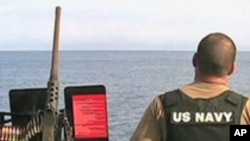In 2008, Somali pirates captured more than 100 large commercial vessels in the Gulf of Aden and the Indian Ocean, provoking a massive international response. Today, some 40 warships patrol Somali waters. The patrols and other measures have helped decrease successful hijacking more than 90 percent. Monsoon winds also contributed to the reduction, but U.S. maritime officials warn hijackings may increase now that the regional monsoon season has ended.
The U.S. Navy destroyer USS Donald Cook departs the port of Djibouti in East Africa, bound for a patrol zone somewhere in the Gulf of Aden.
In 2008, Somali pirates prowling the Gulf of Aden and the Indian Ocean hijacked more than 100 large vessels.
In the last 18 months, warships from more than 12 nations have converged on Somali waters, to combat the pirates. These and other measures have finally had an effect, says the British officer leading the NATO counter-piracy fleet.
"It's significantly down compared to last year," says Commodore Steve Chick.
He says between July and September last year, pirates captured 17 ships. In the same period this year, they captured only one. Commodore Chick says several factors account for piracy's decline.
"Merchant vessels using these shipping lanes are starting to take much better self-protection measures - fire hoses to fend off skiffs coming alongside, barbed wire on the railings and ladders and other access secured - and that's acting as an initial good counter to the pirates," Chick said. "At the same time the naval units here from various nations and organizations are working much closer together and much better with each other, almost seamless boundaries in terms of operations."
The Virginia-based Donald Cook, assigned to NATO, is halfway through a six-month counter-piracy patrol on the Gulf of Aden.
For Donald Cook's 250 sailors, defeating piracy means long, hot days on unforgiving seas, far from home.
Donald Cook's boarding teams bear the biggest burden.
"It's basically the nautical equivalent of having boots on the ground. You've got to have guys up there that can conduct those inspections and provide intelligence back to the ship of what they see from ten feet [several meters], as opposed to a thousand yards [about a kilometer] away," he said.
To keep pirates at bay, the boarding teams intercept and investigate any suspicious boats.
"We can do as little as come up and say hi how are you, we can do health and comfort searches, we can even searches for illegal things like weapons and drugs and even people," Lieutenant Junior Grade Christopher Bowie, USS Donald Cook said.
With hijackings down more than 90 percent compared to last year, some officials worry that nations will lose their will to continue dangerous, expensive counter-piracy operations, thus allowing the sea bandits to regroup.
"Undoubtedly pirates will change their modus operandi," Chick noted. "They may move further south away. They may move away from the shipping lane."
But for now, the international counter-piracy operation is going strong, despite the harsh conditions.
And Somali pirates are mostly staying at home, to seafarers' great relief.








